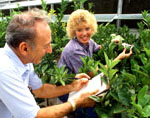|
North Carolina State University-(Ted E. Bilderback and Stuart L.Warren)
At N.C. State, our research and extension programs have focused on environmentally conscious cultural practices for growing nursery stock with emphasis on container substrates, plant and substrate nutrient levels and irrigation management.
As project leaders at the NCSU Horticultural Substrates Laboratory, we evaluate materials as additions to traditional pine bark nursery container potting substrates that may increase water and nutrient efficiency. We have evaluated many products over the years. We test combinations of components for air and water properties, inherent nutrient content and nutrient retention characteristics. In addition, we examine how ratios of components affect growth of container grown nursery crops. Physical properties are normally tested at the beginning and at the end of a growing season in order to determine stability and changes in air and water balance due to decomposition of components.
Results of recent investigations with addition of clay aggregates have shown that a 710 µm – 300 µm (24/48 mesh) calcined (LVM) palygorksite-bentonite mineral (Oil-Dri Corporation of America, Chicago,
IL) can reduce phosphorus leaching, reduce water application volumes, and maximize growth when used to amend pine bark at ≈ 11% (by vol.) versus pine bark only substrates. A clay amended pine bark substrate engineered to retain water and fertilizers can also increase growth and provide an alternative BMP without costly infrastructural changes.
Water application efficiency (WAE) has been an important focus in our research program. We have studied effects of cycled irrigation in low volume irrigation systems, specifically, how time-averaged application rate (TAAR) effects plant growth and physiological responses. TAAR is a step toward reducing wide fluctuations in moisture content of container substrates and also moderates extreme container temperatures during sunny hours of the day.
Our current focus is to develop new irrigation technology that will allow us to maintain adequate water in the substrate while achieving zero (0) leaching fraction. Maintaining adequate plant growth while maintaining zero leaching fraction will minimize most of water and nutrient concerns.
|





